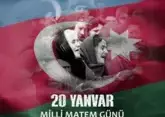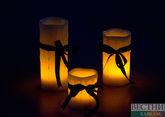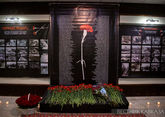Every Jan. 20, Azerbaijan remembers the martyrdom of more than 130 Azerbaijani citizens killed by the Soviet troops in 1990. Korean Times reports in its article Azerbaijan remembers martyrs from 1990 “Black January” that the bloody crackdown, ordered by then Soviet Union President Mikhail Gorbachev, eventually led to Azerbaijan's declaration of independence on Oct. 18, 1991, and is therefore viewed as "the rebirth" of the Azerbaijan Republic. The country declared its first independence in May 1918, after the Russian Empire collapsed.
Marking the 29th anniversary of "Black January," the Azerbaijan Embassy in Korea last week described the event as "the obvious display of the ability of Azerbaijani people to reserve the longstanding historical heroism and to resist the cruel attacks for the sake of the freedom and independence of their motherland at the cost of losing their lives."
"Their bravery made a vivid history in the chronicle of heroism of our country."
More than 26,000 Soviet troops stormed Azerbaijan's capital of Baku on Jan. 20, 1990 and shot unarmed protesters.
Over 130 people, including children, women and the elderly, were killed, around 800 people were wounded, 841 men were illegally arrested and five are still missing.
The pretext was a massive popular uprising in Baku, calling for Azerbaijan's independence from the USSR.
"The violence used by former Soviet Army aiming to destroy the martial spirit of the nation was out of proportion to the intention of freedom and independence," the embassy said.
The extreme session of the Supreme Council of the Azerbaijani Soviet Socialist Republic (SSR) took place right after the massacre to evaluate the event. The session adopted the Decree of the Supreme Council of the Azerbaijani SSR "On cancellation of the state of emergency in Baku city," and also the appeals to the USSR Supreme Council, Supreme Councils of union republics, and the parliaments of all countries.
"The operation conducted by Soviet troops was a distinct and harsh violation of the Final Act of Conference for Security and Cooperation in Europe (CSCE) of 1975, Final Document of Viennese meeting of CSCE of 1989, Declaration on the Protection of Women and Children in Emergency and Armed Conflict of 1974, Convention on the Rights of the Child 1989, acting conventions regulating waging of war, in particular, fourth Hague Convention about the rule and customs of land war of 1967."
Gorbachev, widely credited with facilitating the communist bloc's disintegration, for which he was awarded the Nobel Peace Prize in 1990, conceded in 1995, "The declaration of a state of emergency in Baku was the biggest mistake of my political career."
The Azerbaijani people buried their martyrs in Mountain Park, the highest spot in Baku, which was later named Martyrs' Avenue. Since 1994, Jan. 20 has been commemorated as National Mourning Day.
Martyrs' Avenue is a most sacred place for every Azerbaijani. Every year millions of Azerbaijanis visit Martyrs' Avenue and lay carnations on the graves.
This ceremony begins in the early morning when the president and representatives of foreign missions lay wreaths at the eternal flame.










